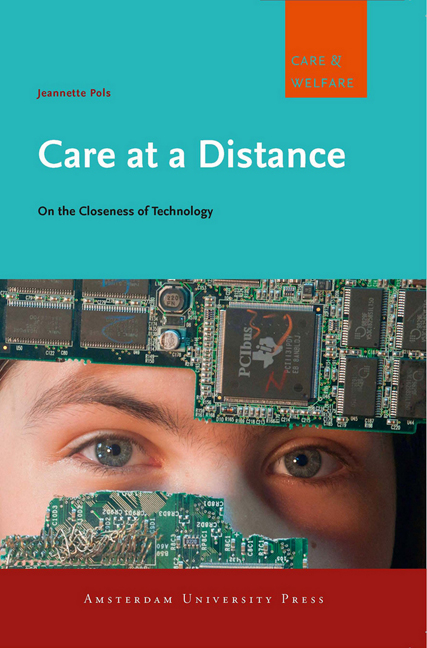Book contents
- Frontmatter
- Contents
- Nightmares, Promises and Efficiencies in care and Research
- Part I Norms and Nightmares
- Part II Knowledge and Promises
- Part III Routines and Efficiencies
- Conclusions: On Studying Innovation
- Acknowledgements
- Appendix: Projects Studied for this Book
- Notes
- References
- Index of Names
- Index of Subjects
5 - Knowing Patients: On Practical knowledge for Living with Chronic Disease
Published online by Cambridge University Press: 03 February 2021
- Frontmatter
- Contents
- Nightmares, Promises and Efficiencies in care and Research
- Part I Norms and Nightmares
- Part II Knowledge and Promises
- Part III Routines and Efficiencies
- Conclusions: On Studying Innovation
- Acknowledgements
- Appendix: Projects Studied for this Book
- Notes
- References
- Index of Names
- Index of Subjects
Summary
The knowledge of patients
In the previous chapter, the examples of Mrs Jansen and Mrs Jaspersen and their respective telecare devices showed how they used norms and knowledge from different logics they had to somehow fit together. To the facts, values and directives derived from devices and professionals, both women added their own experiences. By using the webcam, Mrs Jaspersen could develop yet a different kind of knowledge by sharing her concerns about living with COPD with her fellow patients. In this chapter, I look at how people with severe COPD use knowledge in their daily life practices to deal with their disease and the things they want to do in life. What kind of knowledge is this? How does it relate to professional knowledge? How can telecare devices such as the webcam support the development and use of this knowledge?
Studying the knowledge of patients is, however, easier said than done. There is much opacity on what this knowledge could be about and how to study it. The main pitfalls seem to be either completely separating the knowledge of patients from medical science and technology or making them the same. A way out of these difficulties is to ignore the knowledge of patients and professionals for the greater good of ‘empowering’ patients. Obviously, this does not help much to put the knowledge of patients on the research agenda, even if it does greatly influence ways of thinking about patients and what they can and should do. Before analysing the practices of people with COPD, I will briefly consider these problems, in order to avoid them and prepare the tools for the analysis.
Knowing patients?
The question of what the knowledge of patients is must be placed in the context of the emancipation of patients. The days are long gone when doctors and others saw patients as passive and ignorant lay people dependent on and sometimes abused by medical/research practices. Modern patients have gained influence in medical practices and in the production of medical knowledge. Health care policies, laws and guidelines have been developed and implemented to protect and make use of the new position of patients. What happened to the knowledge of patients in this process?
- Type
- Chapter
- Information
- Care at a DistanceOn the Closeness of Technology, pp. 79 - 96Publisher: Amsterdam University PressPrint publication year: 2012



